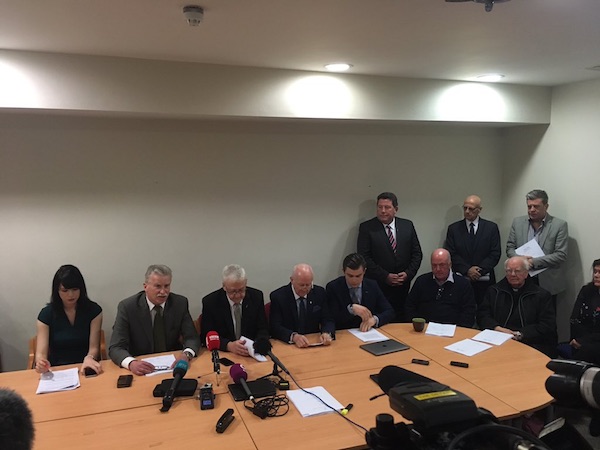
A decision by the European Court of Human Rights has been described as a bad day for justice after it refused to revise a judgement that the ‘Hooded Men’ did not suffer torture at the hands of their British military captors in 1971.
The 14 men, interned in 1971, endured a range of torture and terror techniques, ranging from hooding with heavy sacks, sleep deprivation to being thrown out of a helicopter. No one was ever convicted of wrongdoing.
The Dublin government had called on the court to revise a 1978 judgement and accept that the ‘Hooded Men’ suffered torture, not just inhuman and degrading treatment.
The European Commission accepted that the mistreatment of the men was torture, but in 1978 the European Court of Human Rights held that the men suffered “inhumane and degrading treatment” that did not amount to torture.
That judgement has always mystified Irish nationalists and human rights organisations. Amnesty International has said that finding has had disastrous consequences and has been used by the various governments to justify the use of torture methods across the world.
Following new evidence and amid pressure from Amnesty, the Irish government took legal action. New evidence which was uncovered from national archives in London and presented to the court included a letter dated 1977 from Britain’s then-home secretary Merlyn Rees to Britain’s then-prime minister James Callaghan in which he states his view that the decision to use “methods of torture in Northern Ireland in 1971/72 was taken by ministers - in particular Lord Carrington, then secretary of state for defence”. Rees added that “a political decision was taken”.
However, the court ruled today that Dublin’s legal team “had not demonstrated the existence of facts that were unknown to the court at the time or which would have had a decisive influence on the original judgment. There was therefore no justification to revise the judgment”.
The court did not appear to reconsider the fundamental question of whether the five techniques -- hooding, stress positions, white noise, sleep deprivation and deprivation of food and water, along with beatings and death threats -- amounted to torture.
The revision request was dismissed by six votes to one, with the Irish judge dissenting. Judge Siofra O’Leary said she disagreed with the decision of the majority to dismiss “non-disclosed” information from the British government, as well as new evidence to do with medical matters. She said the majority restricted their legal analysis further by concentrating exclusively on just two internees.
Sinn Fein MEP Martina Anderson said she was disappointed by the judgement.
“There was an onus on the Irish government to prepare a through, exhaustive and well-argued case, and they failed. It is clear the five cruel techniques that the British state used against 14 men is torture,” she said. “Justice will be heard,” she added.
Grainne Teggart, Amnesty campaigns manager, said the court had “missed a vital opportunity to put right a historic wrong. Instead, it relied largely on procedural arguments to avoid substantively revisiting its 1978 ruling.
“Forty years ago, the UK succeeded in persuading the Court to absolve it of the ‘special stigma’ of a finding of torture. It did this by deliberately withholding from the Court evidence it had about the severe physical and psychological suffering that these ‘techniques’ inflicted. It also claimed this was the unsanctioned behaviour of local military and police.
“When Amnesty visited the detainees in 1971, we found clear evidence of torture. Our findings have not changed in the years that have passed.
“What has been revealed in the files withheld by the UK Government cannot be denied. These men were tortured, and with approval at the highest levels of Government. The record of what these men endured in those interrogation rooms 47 years ago, and the devastating impact on them afterwards, still stands.
“The ‘hooded men’ have been denied justice for too long. The UK Government must now urgently conduct an independent and effective investigation into what happened, and prosecute any state agents involved in sanctioning or carrying out these violations at the time.”
In a press conference today, the Hooded Men asked for the ruling to be appealed by the Irish government. Liam Shannon said they were “totally dismayed” by the judgement and says he “absolutely” believes the men were tortured.
“Justice Maguire in the High Court in Belfast two or three weeks ago agreed with that. Lord Bingham, the highest law lord in England, agreed with that, that what happened to us was torture. There’s no doubt it, it was torture, and it will always be torture as far as we’re concerned.”
Another of the men, Francie McGuigan said the court had missed a great opportunity to stamp out torture all over the world. He said the judgment reinforced the notion that governments can “drag citizens from their bed and degrade and humiliate them”.
He added that the ruling was “only a setback” on a “long and hard struggle”.
![[Irish Republican News]](https://republican-news.org/graphics/title_gifs/rn.gif)
![[Irish Republican News]](https://republican-news.org/graphics/title_gifs/harp.gif)

